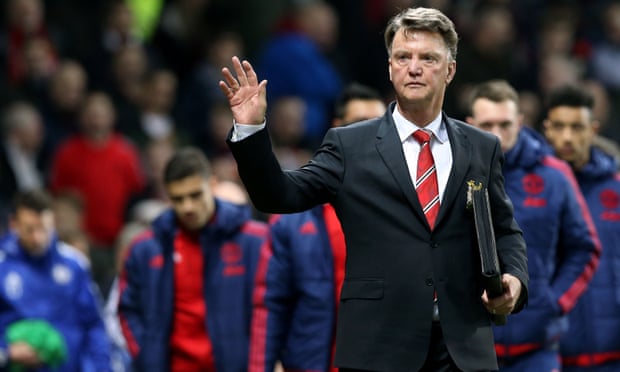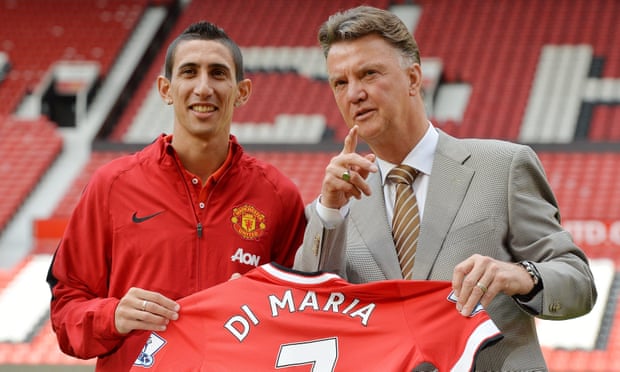Louis van Gaal was doomed at Manchester United by refusal to adapt
At times like this it is impossible not to spool back to May 2013, and the sight of Sir Alex Ferguson centre stage at Old Trafford, standing in the rain surrounded by the absolute and unconditional admiration of everyone inside the stadium as he made one crucial political point in his farewell speech.
“I’d also like to remind you that when we had bad times here, the club stood by me, all my staff stood by me, the players stood by me.
Your job now is to stand by our new manager.
That is important,” he stressed. The crowd applauded with recognition and respect. He knew. Of course he knew. Nobody knew better than him.
In fairness they tried. United’s hierarchy tried and the majority of the support base tried to stand by those who followed in his wake.
For 10 distinctly uncomfortable months they tried not to be too uppity about the fact David Moyes was handed a mantle that was too onerous to bear.
For two seasons they have watched Louis van Gaal do things his way – not a way in isolation that was compatible enough with United to be classified as successful.
In many respects, Van Gaal has been everything Moyes was not, and that is the whole point.
Where Moyes had spent his entire managerial career in the north-west of England, Van Gaal’s gilded CV made him a grandee at Ajax, Barcelona and Bayern Munich.
Where Moyes had a style that was determined and canny and punched above its weight, Van Gaal was educated in the cultured Dutch school.
Where Moyes had won what is now League One with Preston North End, Van Gaal possessed a trophy cabinet that commanded respect, with seven league titles from four different clubs, cups in three different countries, and a Champions League title.
All the signs suggested Van Gaal, fresh from a display of his managerial prowess at the 2014 World Cup that arguably made him the coach of the tournament, would bowl into Manchester with big ideas, big personality and make everything better.
However, in one piercing reality, Van Gaal and Moyes have been thrust into the same boat.
Ejected prematurely from Old Trafford in the post-Ferguson years, reputations dented by an experience that underwhelmed, it has not been anything it was cracked up to be.
United’s Van Gaal era will be remembered as a bizarre cocktail that did not have much of a kick after all.
Triumph in the FA Cup has not been enough to save him. Slipping back out of the Champions League qualification places was never going to reflect well.
But equally dispiriting was a brand of football that might have been indulged in his first season while he was having to rebuild but in his second has too often been alien to the United DNA and even “boring” (Peter Schmeichel’s damning choice of word, no less).
The board stood by him during a disastrous December when they could not win a game but clearly faith in Van Gaal’s capacity to revive United to the point they could challenge for the most important honours could not be sustained.
The mood that provoked some fans to boo him as he stepped up to speak before the lap of appreciation at the last home game of the season revealed problems the FA Cup alone could not fix.
Louis van Gaal’s failure to get the best from Ángel di María and his willingness to sell the Argentinian after one season rang alarm bells.
Van Gaal, this singular man, who has at times in a 30-year management career inspired some outstanding teams, and at others had no qualms about entering into a footballing conflict, has always insisted on doing things his own way.
That, perhaps, was his undoing. If a manager’s philosophy and a club’s culture are thrown into a melting pot, the key is to find the right balance for the chemistry to work.
All managers have to try to crack that critical first-impression exercise of working out where on the spectrum between his way and the club’s way he wants to pitch himself early on.
It is what Claudio Ranieri did so superbly this season. It is what Pep Guardiola and Antonio Conte will aim to get right this summer.
It is worth revisiting the fable of Ángel Di María, the record signing who disappeared without ceremony.
Eleven months after he joined to great acclaim Di María failed to board a flight to the United States for the club’s pre-season tour and within a matter of days he was sold to Paris Saint-Germain.
A record signing with pedigree being sparingly used, positionally challenged and quickly discarded within a year? Alarm bells duly clanged. No second-season chances.
No sense of working with a major talent to try to give him the platform to express himself. All very awkward.
The Argentinian later explained that it was the manager’s “philosophy” that he couldn’t handle.
“It’s difficult to adapt to Van Gaal,” he said. “I had a number of flare-ups with him.” There, in that admission, is a nerve being struck that gets to the heart of United’s difficulty in trying to move forward with this strident 64-year-old Dutchman.
This notion of adapting to Van Gaal, of that being a sort of one-way-traffic requirement, has been the undercurrent throughout these two years.
Memphis Depay was signed by Louis van Gaal but has made minimal impact at Manchester United.
Some players have fared better than others with that, particularly the youngsters who have added freshness to United’s attack during the better times this season.
The emergence of Anthony Martial, Jesse Lingard and the whirlwind promise of Marcus Rashford will stand United in good stead.
But the flipside is embodied by two Dutchman who fared so well under Van Gaal at the last World Cup so presumably knew exactly what to expect.
Robin van Persie fell from grace and left, and Memphis Depay has made a minimal impact.
So now, after two clunky goes in the post-Ferguson years United must try again to find a smoother fit. United’s executive vice-chairman, Ed Woodward, obviously wanted Van Gaal to succeed.
There is pressure to create a template that is more long term, more respectable than the loose hire-and-fire circus the majority of clubs operate in.
Everybody knows United want an ambitious, exciting playing style to stir the senses. They also want to have strong values, with long-term trust in their staff if at all possible.
Firing up both those two elements simultaneously has basically proved to be too much for United under Van Gaal. Avoiding the quick-cycle turnover of managers may well be part of their thinking but it is easier said than done.
There is not exactly a convincing shortlist of managers with the profile to come in, reboot Manchester United, and stay for ages; José Mourinho’s record does not suggest longevity.
Van Gaal has said this would be his last job, though an unhappy ending may force him to reconsider.
After a colourful career, if this really is retirement from the management game, it is a sorry way to go, but one that feels inescapably of his


Comments
Post a Comment